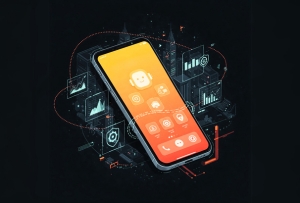At Experion Technologies, we empower insurance providers to stay ahead of the digital curve with scalable, secure, and user-friendly mobile and web app solutions tailored for the modern policyholder.
In today’s fast-paced digital era, the insurance industry is undergoing a seismic transformation. The days of paper-heavy processes and in-person consultations are quickly giving way to real-time policy access, instant claims processing, and personalized experiences—all delivered through intuitive mobile platforms. As more consumers expect seamless digital interactions, insurance mobile app development has become a strategic imperative rather than a competitive advantage.
The Evolution of Insurance Mobile Apps

Traditional vs. Digital Insurance Processes
Traditionally, buying or managing insurance involved face-to-face meetings, physical paperwork, and long turnaround times. These manual processes led to inefficiencies, errors, and frustrated customers. Today, insurance mobile apps have revolutionized this experience.
Customers can now:
- Browse policies
- Get instant quotes
- File claims
- Track approvals- all within minutes from their smartphones.
This digital transformation not only enhances user satisfaction but also drastically reduces operational burdens for providers.
Growth of Insurtech and Mobile-First Solutions
The insurtech boom has redefined the landscape. Startups and legacy insurers alike are embracing mobile-first solutions to meet evolving consumer demands. Mobile apps have become the primary interface between insurers and customers, offering convenience, transparency, and control.
- Investment in insurtech has surpassed billions globally.
- The rise of microinsurance and usage-based insurance is driving mobile app demand.
- Younger, tech-savvy users expect end-to-end services on mobile platforms.
The Impact of AI, IoT, and Big Data on Insurance App Development
Technologies like Artificial Intelligence (AI), Internet of Things (IoT), and Big Data are integral to modern insurance app development. These innovations enable:
- Predictive underwriting
- Real-time risk analysis
- Personalized premium structures
- Intelligent fraud detection
Cloud-based infrastructure combined with these technologies makes insurance mobile app development not only scalable but also future-proof.
Types of Insurance Mobile Apps
Different insurance verticals require unique app features and functionality. Here are the most prominent categories:
- Health Insurance Apps
- Track policies and benefits
- Manage medical claims
- Integrate with telehealth platforms
- Store digital health cards and EHRs
- Life Insurance Apps
- Monitor premium payments
- Set up investment portfolios and track returns
- Receive automated reminders and policy maturity alerts
- Calculate coverage needs using in-app tools
- Auto Insurance Apps
- Instant claims filing with photo uploads
- GPS tracking for stolen vehicles
- Access to roadside assistance
- Driving behavior monitoring for discounts
- Property & Home Insurance Apps
- Integrate with smart home systems to assess risks
- Schedule property inspections
- Document home inventory via photos or videos
- Manage natural disaster coverage
- Travel Insurance Apps
- Real-time emergency assistance
- Immediate policy issuance while traveling
- Quick claims filing for cancellations or medical emergencies
- Multi-language support for global travelers
- Business & Commercial Insurance Apps
- Manage group policies and compliance
- Track renewal timelines
- Submit and manage claims across branches
- Provide insurance to employees via a secure portal
Must-Have Features in an Insurance Mobile App

A well-rounded insurance mobile app must not only meet customer expectations but also address backend complexity, compliance, and innovation. To create a winning experience, it’s important to embed both customer-centric features and advanced technologies that enhance functionality and future-proof the platform.
Customer-Centric Features
These features are designed with the end-user in mind, ensuring the app delivers usability, trust, and self-service empowerment.
- User-Friendly Interface & Navigation
A smooth, intuitive interface is critical for retaining users and reducing friction.
- Minimalistic design with clear icons and logical flow ensures that users of all age groups can easily navigate the app.
- Color schemes and fonts are selected for readability and accessibility, especially for elderly users or those with visual impairments.
- Intuitive layouts help reduce call center dependency by allowing users to find information or complete tasks independently.
- Secure Authentication (Biometric Login, OTP Verification)
Security is a top concern in insurance mobile app development, given the sensitive personal and financial data involved.
- Biometric login (face ID, fingerprint) adds a seamless layer of protection.
- OTPs (One-Time Passwords) and multi-factor authentication (MFA) provide additional defense against unauthorized access.
- Features like auto-lock after inactivity, and geolocation-based login alerts build user confidence in data security.
- Policy Management (View, Update, Renew Policies)
A mobile app should offer a centralized dashboard where users can:
- Access and view active, expired, or upcoming insurance policies.
- Update personal details, beneficiaries, or coverage options.
- Submit KYC documents or make renewal payments, all within the app.
This reduces administrative burdens and fosters self-sufficiency.
- Instant Quotes and Premium Calculators
Today’s digital-savvy consumers expect transparency and instant gratification.
- Users can input a few details and receive personalized insurance quotes instantly.
- Premium calculators factor in age, lifestyle, risk category, and coverage amount to give real-time estimates.
- This feature empowers users to compare plans, make informed decisions, and increases policy conversion rates.
- Claim Filing and Real-Time Tracking
Claims processing is a make-or-break moment in customer satisfaction.
- The app allows policyholders to initiate claims, upload required documents, images, and even videos.
- Integration with GPS enables location tagging of accidents or events.
- Users receive real-time claim status updates through push notifications or email.
This level of transparency builds trust and reduces frustration during stressful times.
- In-App Payments and Premium Reminders
Secure and seamless payment options encourage timely transactions.
- Integration with credit cards, digital wallets, UPI, and net banking for flexibility.
- Auto-payment setup prevents policy lapse.
- Push notifications or SMS/email reminders help users stay on track with premium deadlines.
- AI-Powered Chatbots and Virtual Assistants
AI-driven chat interfaces are a must for 24/7 support.
- Handle common tasks like quote requests, claim status, and policy lookup.
- Offer contextual, conversational assistance in multiple languages.
- Learn user behavior over time to make personalized suggestions and faster resolutions.
Advanced & Innovative Features
Forward-thinking features transform an app from functional to futuristic, keeping insurance providers ahead of the curve.
- AI & Machine Learning
AI capabilities make apps smarter and more efficient:
- Fraud Detection: Pattern recognition and anomaly alerts to catch suspicious claims in real-time.
- Personalized Product Suggestions: Recommends plans or add-ons based on customer behavior, search history, and claim patterns.
- Churn Prediction: Identifies at-risk customers and triggers retention workflows with personalized offers or communication.
- IoT Integration
The Internet of Things bridges the digital and physical worlds in insurance web app development and mobile platforms.
- Health Insurance: Wearables like smartwatches track vitals, enabling wellness discounts.
- Auto Insurance: Vehicle telemetry monitors driving behavior for usage-based insurance (UBI) and safer driving rewards.
- Home Insurance: Smart sensors detect smoke, leaks, or break-ins and can automatically alert the app or start a claim process.
- Blockchain for Security
Blockchain ensures data integrity and trust through decentralized ledgers.
- Tamper-proof transaction records reduce claims disputes and audit overhead.
- Smart contracts automate policy triggers, reducing manual intervention.
- Interoperability with reinsurers streamlines claims settlements and improves transparency across the ecosystem.
- Telematics for Auto Insurance
Telematics goes beyond GPS tracking to include comprehensive vehicle behavior analysis.
- Data on acceleration, braking, night-time driving, and speed limit adherence is used to assess driving habits.
- Good driving behavior leads to premium discounts and personalized driving tips.
- Alerts for vehicle servicing or unsafe habits can be sent proactively.
- AR/VR for Customer Support
Augmented and Virtual Reality create immersive, educational, and support-rich experiences.
- Policy Walkthroughs: Use AR to visually guide customers through their coverage.
- Damage Assessment: Simulate accident scenarios to explain coverage, or assess property/home damages virtually.
- Onboarding and Training: Use VR to walk new users through app features or benefits of policy options.
Key Benefits of Insurance Mobile Apps
Modern insurance apps don’t just digitize existing processes, they enhance them. They create a win-win situation for both customers and insurers.
For Customers
- 24/7 Accessibility & Self-Service Options
- Customers can browse, compare, purchase, and manage policies at their convenience no waiting in queues or restricted office hours.
- Self-service empowers users and builds a sense of control over their financial well-being.
- Faster Claims Processing & Settlements
- Automating the claims journey submission to settlement reduces approval time from days to hours.
- Photo/video uploads, AI-based damage assessment, and digital document verification speed up the process.
- The result? Higher customer satisfaction and stronger brand trust.
- Personalized Policy Suggestions
- Intelligent algorithms analyze customer profiles, driving patterns, medical history, and behavior to suggest optimal plans.
- This reduces overwhelm, improves decision-making, and boosts confidence in coverage choices.
- Better Engagement & Communication
- Push notifications about policy renewals, premium due dates, or claim updates keep users informed.
- In-app messaging and educational content (e.g., blog articles, videos) keep users engaged and improve financial literacy.
For Insurance Providers
- Improved Customer Retention & Brand Loyalty
- A seamless digital experience increases long-term engagement.
- Features like loyalty rewards, easy renewals, and proactive support encourage repeat business.
- Data-driven personalization helps providers stay top-of-mind with their customer base.
- Operational Cost Reduction
- By moving key functions such as claims, KYC, and customer support into the app, providers significantly reduce call center, paper, and branch overheads.
- Automation and self-service translate to lower staffing needs and better efficiency.
- Real-Time Analytics & Risk Assessment
- Every interaction on the app is a data point, helping insurers better understand user behavior, preferences, and risk profiles.
- This data informs pricing models, product development, and fraud detection strategies.
- Insurers can shift from reactive to predictive strategies, improving profitability and risk management.
- Fraud Prevention & Compliance Management
- AI-powered fraud detection engines can flag inconsistencies during claims or policy creation.
- Apps maintain detailed audit trails for every action, ensuring transparency and meeting regulatory requirements.
- In-built compliance protocols support GDPR, HIPAA, and other international regulations, particularly for health and life insurance.
In summary, a successful insurance mobile app is not just about replicating offline features in a digital shell, it’s about enhancing experiences, optimizing workflows, and building trust through innovation. Whether serving individual policyholders or commercial clients, the combination of customer-centric and advanced features enables insurers to lead in a highly competitive market.
Experion brings decades of experience in crafting insurance mobile and web app solutions that combine intuitive user experience with industry-grade compliance and backend scalability.
Steps: Successful Insurance Mobile App Development

- Market Research & Competitor Analysis
Understanding consumer pain points, app usage trends, and gaps in current offerings is critical. - Defining Key Features & Functionalities
Identify core features (policy management, claims) and advanced ones (AI, IoT) based on the target audience. - Choosing the Right Tech Stack
Select native (iOS/Android) or cross-platform frameworks based on app goals. API integration, cloud hosting, and security stacks are essential. - UI/UX Design
Design apps that are not only functional but also accessible to users of all ages and tech literacy levels. - Development & Testing
Use agile methodologies for iterative builds and incorporate robust testing—especially for data protection and compliance. - Regulatory Compliance
Ensure alignment with standards like:
- HIPAA (for health data)
- GDPR (for EU users)
- PCI DSS (for payments)
- Launch & Continuous Improvement
Post-launch, monitor performance, gather user feedback, and roll out new features regularly to stay competitive.
Challenges in Insurance Mobile App Development & Solutions
While insurance mobile app development brings tremendous opportunities, it also comes with a unique set of challenges. The industry’s regulatory complexity, legacy system dependencies, and high user expectations create a demanding development environment. Below is an in-depth look at key hurdles and how insurance providers can strategically overcome them:
- Data Security & Compliance
Challenge:
Insurance mobile apps handle highly sensitive data—personal identifiers, medical records, financial information, and behavioral data. That’s why it is an attractive target for hackers and cybercriminals. Compliance with strict industry regulations such as HIPAA, GDPR, and PCI DSS adds another layer of complexity.
Solution:
- End-to-end encryption ensures that data remains secure during both transmission and storage. AES-256 and TLS protocols are industry standards.
- Regular penetration testing helps identify vulnerabilities before they can be exploited.
- Multi-factor authentication (MFA) adds extra layers of verification, making unauthorized access significantly harder.
- Compliance can also be streamlined through automated compliance tools, audit logs, and dynamic data governance built into the mobile architecture.
- Complex Claims Processing
Challenge:
Insurance claims are often non-linear, involving varying documentation, approvals, field assessments, and human judgment. Automating this process, especially across different insurance verticals (auto, health, property), can be daunting.
Solution:
- AI-driven rule engines can categorize and handle standard claims automatically, flagging only the outliers for human review.
- Intelligent document recognition (OCR) allows apps to auto-extract data from uploaded claim forms, bills, or damage evidence.
- Workflow automation tools can dynamically adjust paths based on claim types and urgency.
- Implementing a claims wizard UI within the app can guide users step-by-step through what to submit and when.
- User Adoption & Engagement
Challenge:
Despite the rise of digital-first consumers, a sizable portion of insurance users, especially in older demographics may still prefer traditional interactions like agent consultations or in-branch visits.
Solution:
- Design the app with simplicity and accessibility in mind: larger fonts, intuitive menus, and multi-language support.
- Provide clear onboarding flows or tutorials that explain how to use the app.
- Offer incentives such as loyalty points, premium discounts, or exclusive offers for digital usage.
- Personalization engines can create tailored experiences based on user profiles, increasing relevance and engagement.
- Integration with Legacy Systems
Challenge:
Many traditional insurers still rely on monolithic, on-premise legacy systems for core operations. Integrating a modern mobile app with such systems can slow down development and affect real-time responsiveness.
Solution:
- Use secure APIs to expose key functionalities (e.g., claims, policy data) from legacy systems to the mobile layer.
- Introduce microservices to break down monolithic applications into manageable components, enabling smoother updates and scaling.
- Leverage insurance web app development alongside mobile development to provide a unified digital transformation layer that connects old and new systems.
Gradual migration strategies, starting with non-critical functions can reduce risk while modernizing the stack.
Future Trends in Insurance Mobile App Development

The insurance industry is undergoing a rapid evolution, powered by emerging technologies and changing customer expectations. The future of insurance mobile app development will focus on delivering proactive, personalized, and frictionless experiences, while embedding insurance in the broader digital lifestyle of users.
- AI-Driven Predictive Analytics
What to Expect:
Insurance apps will move beyond reactive services to predictive intelligence.
- Based on health data from wearables, AI will forecast potential medical conditions and recommend suitable policies.
- Lifestyle inputs (diet, fitness, driving habits) will influence premium adjustments in real time.
- Predictive claims management will help detect high-risk customers and prevent fraudulent claims before they occur.
Impact:
Policyholders receive more tailored products, while insurers can better manage risk and cost.
- Blockchain-Powered Smart Contracts
What to Expect:
Smart contracts will automate policy issuance, renewal, and claims, removing the need for manual verification and reducing fraud.
- Example: In travel insurance, a smart contract can trigger a payout if a flight delay is recorded in real-time data.
- Claims that meet predefined conditions can be automatically approved and settled without human intervention.
- Blockchain will also provide tamper-proof policy histories, improving auditability and trust.
Impact:
Reduces paperwork, increases efficiency, and brings transparency to policyholder-insurer interactions.
- Voice-Activated Virtual Insurance Agents
What to Expect:
With the rise of virtual assistants like Alexa, Siri, and Google Assistant, voice-powered insurance apps will gain popularity.
- Users will file claims, inquire about policy status, or make payments through voice commands.
- Integration with smart devices will allow hands-free access for users while driving or multitasking.
- These agents will use Natural Language Processing (NLP) to offer conversational, human-like support.
Impact:
Increased accessibility, especially for visually impaired or older customers, and faster service delivery.
- Use of Drones & IoT for Claims Assessment
What to Expect:
- Drones will be used to assess property or disaster-related damages, especially in remote or unsafe areas.
- IoT sensors in homes or vehicles will provide real-time incident data, such as fire, flood, or collision events.
- This tech-driven approach reduces claim disputes and accelerates claim validation.
Impact:
Lower operational costs for insurers, faster claim resolutions, and greater trust from customers.
- Embedded Insurance & Microinsurance Models
What to Expect:
Insurance will no longer be a separate purchase, it will be integrated into digital touchpoints users already engage with.
- Buy travel insurance at the time of booking a flight through a travel app.
- Add device protection at checkout when buying a smartphone online.
- Subscribe to microinsurance for daily wage protection or parcel insurance at low, flexible premiums.
Impact:
Removes friction from the purchase journey and unlocks new distribution models, especially for underserved or gig economy segments.
How Experion Can Offer Support
Experion Technologies is your trusted partner in building next-generation insurance mobile and web apps that prioritize user experience, data security, and innovation.
Our teams specialize in:
- Designing custom insurance mobile apps for health, auto, life, and property coverage.
- Integrating advanced tech like AI, IoT, and blockchain.
- Enabling legacy modernization through robust APIs and cloud migration.
- Supporting multi-device compatibility (smartphones, tablets, smartwatches).
- Ensuring global compliance with regional data laws and payment regulations.
From strategy to scalability, we work hand-in-hand with insurers to build apps that don’t just meet expectations, but exceed them.
Conclusion
In the digital age, insurance mobile app development is no longer optional it’s vital. As consumers demand more convenience, control, and clarity, insurers must respond with innovative digital platforms that offer both efficiency and empathy. Mobile apps have become the cornerstone of this transformation.
By embracing technology, insurers can streamline operations, boost engagement, and deliver superior customer value. And with the right tech partner, the journey becomes not just manageable, but truly transformative.
Key Takeaways
- The insurance industry is undergoing rapid digital transformation, led by mobile-first strategies.
- Custom insurance mobile apps are empowering users and improving operational agility across verticals.
- Key features include real-time claims tracking, AI-driven insights, and secure document management.
- Experion brings deep domain knowledge and cutting-edge technology to every insurance web app development and mobile engagement.
- The future will see more intelligent, connected, and proactive insurance platforms, starting with your mobile strategy.
- Customer expectations are evolving—policyholders now demand 24/7 self-service, transparent processes, and personalized interactions.
- AI and machine learning will play a pivotal role in fraud detection, churn prediction, and personalized coverage recommendations.
- IoT integration will enable usage-based and behavior-based insurance models, creating dynamic premium structures.
- Blockchain and smart contracts will revolutionize policy validation and claims automation, increasing speed and transparency.
- Voice-enabled assistants and AR/VR will redefine customer support, improving accessibility and user understanding.
- Microinsurance and embedded insurance models will unlock new markets and revenue channels, especially through mobile apps.
- Seamless integration with legacy systems and cloud infrastructure is critical for ensuring business continuity and scalability.
- Security, compliance, and data privacy must be foundational in every insurance app development initiative.
- Mobile apps enable insurers to reduce operational costs while increasing retention, satisfaction, and lifetime value.
- Continuous innovation, regular updates, and user feedback loops are essential to keeping your app relevant and competitive.
Experion Technologies helps insurance providers future-proof their digital strategy through secure, scalable, and user-centric mobile app development. Let’s build what’s next, together.

